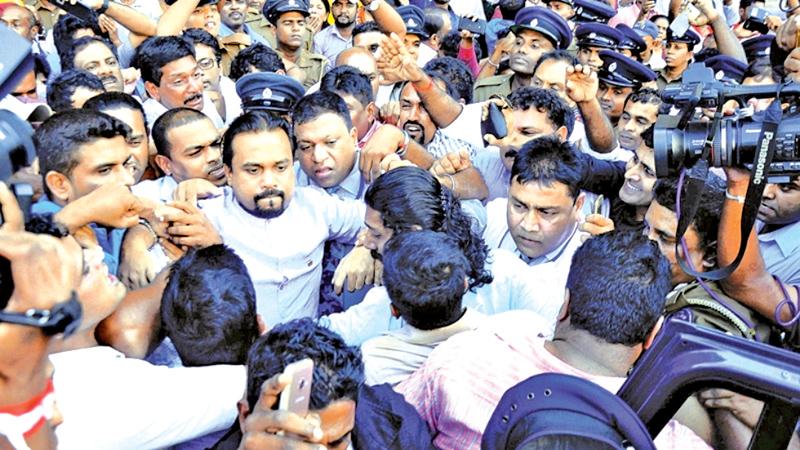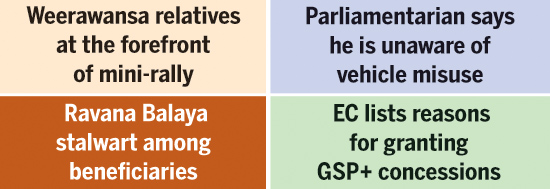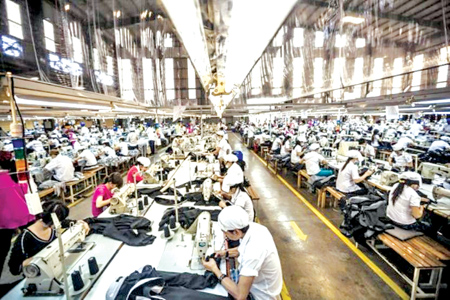

National Freedom Front (NFF) leader and UPFA Parliamentarian Wimal Weerawansa was arrested last week by the Police Financial Crimes Investigations Division (FCID), for the abuse of state vehicles.
Several politicians and state officials under the previous government were under investigation for the same charge over the past few months, leading to the Joint Opposition’s accusation that supporters of former President Mahinda Rajapaksa were being harassed over ‘trivial’ charges.
Weerawansa was of the opinion that the investigation against him was part of that same political witch-hunt – something he repeatedly told the media. The allegation that Weerawansa abused vehicles however, was by no means trivial: It was alleged, the former Minister of Housing and Construction misused as many as 40 vehicles while under the Rajapaksa administration.
Relatives
The FCID received complaints that Weerawansa’s close relatives had received vehicles from the institutions under his purview, during the time he was Minister of Housing and Construction (2011 – 2014).
 Records show that one of his nephews - Lalith Pushpakumara, son of his sister Sumanawathie Weerawansa, had received five vehicles (GK-5073, KD-4049, KB-7053, KW-6956, GK-5073, KP-4802) from his Ministry.
Records show that one of his nephews - Lalith Pushpakumara, son of his sister Sumanawathie Weerawansa, had received five vehicles (GK-5073, KD-4049, KB-7053, KW-6956, GK-5073, KP-4802) from his Ministry.
Ridma Vimukthi Weerawansa, another nephew, had also received a vehicle from Weerawansa.
Ananda Ashoka Kumara, the husband of the parliamentarian’s wife’s sister, had received three vehicles (KB-6038, HQ-4974, GR-5774, KI-4648, KA-7440) from Weerawansa’s Ministry.
Another vehicle (GY- 4635) had been given to Pallaperu Gamage Ananda Priyadarshana, the husband of Weerawansa sister, Nilani Weerawansa.
Nilani Weerawansa too, received of her brother’s generosity, with the Ministry releasing a vehicle (JN 8058) for her use.
Aside from relatives, his friends and party activists too had received vehicles from the Ministry, on Weerawansa’s instructions: Among them is a journalist attached to a vernacular newspaper, and several members of the National Freedom Front.
An interesting revelation was the fact that Iththakande Sadhdhathissa Thera, the leader of the Ravana Balaya, was among those who received vehicles from Weerawansa’s Ministry: The Ravana Balaya is an ultra-nationalist group supporting former President Rajapaksa’s political campaign, and has many anti-minority acts to its account.
Weerawansa had also appointed Saddhdathissa Thera as a director of the National Housing Authority – an institution coming under the Housing and Construction Ministry, and these revelations uncover a link between certain violent ultra-nationalist organizations, and the Rajapaksa administration.
Police sources said, the loss incurred by the government due to abuse of vehicles during the time when Weerawansa’s was at the helm of the Ministry, was over Rs. 90 million: It is in this context that Weerawansa was arrested by the FCID, last week.
Weerawansa’s statement to the FCID has also raised eyebrows: While saying he could not recall specific reasons why he obtained vehicles from the Engineering Corporation for his personal staff, he did offer the justification that the Ministry had initiated various large-scale projects under his guidance, and that many people, including his staff members, were committed to ensure its success.
Absolving himself of any wrong, the NFF leader said: “The Minister only gives instructions. It is up to the officials to take action based on the Minister’s instructions, without breaking the law.”
Weerawansa said, he was not aware that vehicles had been obtained by the Ministry for his personal staff, but said, it might have happened based on examples set in the past.
On the allegation that vehicles from his Ministry had been given to his relatives, Weerawansa said he was not aware of such a thing: He did say however, that his nephews Vimukthi Weerawansa and Lalith Pushpakumara - who have allegedly made use of six state-owned vehicles - did ‘voluntary work’ for the Ministry.
He also made the statement that members of his extended family, who are being investigated by the FCID, had been on his personal staff.
Agitation
Weerawansa’ supporters received wind of his impending arrest and began a massive social media campaign urging Rajapaksa supporters to gather in front of the FCID to agitate against the arrest of the parliamentarian.
His party also initiated an island wide poster campaign, describing Weerawansa’s arrest as a political witch-hunt.
Weerawansa’s family was at the forefront of the ‘mini-rally’ held by his supporters near the FCID premises.
Among them were Weerawansa’s sister-in-law Thanuja Nishanthi and her daughter, who were captured on camera cursing the government and those who voted for President Sirisena.
Nishanthi’s daughter, speaking directly to the media, threatened to enter politics to make amends for Weerawansa’s arrest.
While outrage on the part of Weerawansa and his relatives – however misguided – can be empathized with, it calls to question systematic flaws that allow this sort of abuses and blatant self-absolvents.
It is why solid frameworks and policies must come into effect, negating such issues in the future and ensuring that ministers do not spoil their families, friends and party activists with state money and state resources.
GSP Plus
The European Commission, on Wednesday, proposed the European Union restore GSP+ trade concessions to Sri Lanka, on account of the country’s commitment to strengthen good governance, human rights, labour conditions and environment protection.
 GSP+ restored |
President Maithripala Sirisena and Prime Minister Ranil Wickremesinghe were pleased with the EC’s announcement and declared it a major foreign policy achievement by the national unity government, which focused heavily on restoring human rights and democratic values in the country, over the past two years.
EU Trade Commissioner, Cecilia Malmström said, restoring GSP+ preferences, would make a significant contribution to Sri Lanka’s economic development by increasing export to the EU market.
“But, it also reflects the way in which we want to support Lanka in implementing human rights, rule of law and good governance reforms,” she said. “I am confident of seeing timely and substantial further progress in these areas, and the GSP+ dialogue and monitoring features will support this reform process.”
She added that this included Sri Lanka’s counter-terrorism legislation – the Prevention of Terrorism Act – “fully compatible with international human rights conventions”, adding that granting access to the GSP+ scheme did not mean that the situation of the country with respect to the 27 international conventions is fully satisfactory.
“It offers the incentive of increased trade access in return for further progress towards the full implementation of those conventions,” she said, pointing out that it also provides a platform for engagement on all problematic areas.
The GSP + trade preferences will see the full removal of duties on 66 percent of tariff lines, covering a wide array of products, including, textiles and fisheries.
The EU withdrew the GSP+ facility in 2010, over the previous regime’s inability to assure human rights, promote reconciliation and comply with international labour regulations. These trade concessions were designed to support developing countries.
The proposal by the European Union’s executive body leaves the European Parliament and the Council with up to four months to raise potential objections before the measures become effective.
Commission’s detailed report
The Commission’s full report on assessment of the application for GSP+ by Sri Lanka listed key reasons for the European Commission’s move to propose the facility for Sri Lanka:
It welcomed reforms adopted by Sri Lanka, especially, after the new government came to power – ‘…Since 2010 there are significant elements of progress. In this respect, Sri Lanka has implemented several important actions to address observed shortcomings and respond to recommendations made in the report of the CESCR.
A new independent Human Rights Commission of Sri Lanka (HRCSL) and several other Commissions have been appointed following the enactment of the 19th Constitutional Amendment in May 2015.
The National Plan of Action for the Promotion and Protection of Human Rights 2011-2016 was adopted and a process is underway for a new Action Plan 2017-2021. The Employment of Women, Young Persons and Children (Amendment) Act (2003) has been adopted, raising the minimum age of employment from 12 to 14 years.
In addition, the age of compulsory schooling has been raised from 14 to 16 years. In order to improve freedom of association in EPZs, two more free facilitation centers have been established in Wathupitiwala and Kandy, in addition to the three existing ones, to allow trade union leaders to meet their members.
Furthermore, a strengthened labour administration system is in place in respect of EPZs, whereby Labour Inspectors visit the Zones with a view to address the concerns of workers. The National Human Resources and Employment Policy for Sri Lanka sets eliminating child labour in hazardous activities as a priority, and a goal of zero tolerance for the worst forms of child labour by 2016.
Sri Lanka has established the Ministry of Foreign Employment and adopted the Sri Lanka National Policy on Labour Migration which focuses on concerns of migrant women workers.
It should also be noted that Sri Lanka has achieved or almost achieved Millennium Development Goals, especially, in health, education, gender equality and child mortality (Sri Lanka Millennium Development Goals Country Report 2014). Furthermore, Sri Lanka has ratified a number of international instruments, including the two Optional Protocols to the Convention on the Rights of the Child; the Convention on the Rights of Persons with Disabilities, as well as, ILO Conventions related to discrimination in employment and occupation (Convention 111); minimum age of employment (Convention 138) and the worst forms of child labour (Convention 182).
Moreover, important legislative processes are ongoing, which are also a response to specific recommendations made in the report of the CESCR.
In order to provide equal land succession rights to men and women an amendment to the Land Development Ordinance is in preparation. A Committee was appointed in June 2016, which is working on amendments to Muslim Law, regarding the minimum age of marriage. The Prevention of Domestic Violence Act (2005) is being amended to provide safeguarding measures for children and women.
In conclusion, despite the fact that in 2010 salient shortcomings have been identified in an important number of areas, following the election of a new President and government in 2015, there are also significant elements of progress, a willingness to address the issues and a general commitment to improve implementation of GSP+ relevant conventions.
The Sri Lankan authorities cooperate with international organizations to address the issues of, for example, child labour, trade union access to EPZs and sexual harassment at the work place. A number of legislative reforms have been initiated to strengthen the protection of women and ensure their equal rights. Thus, the shortcomings do not amount to a serious failure to effectively implement the Convention that would prevent Sri Lanka from joining the GSP+…’
‘…In summary, the monitoring bodies of the relevant conventions have detected salient shortcomings in connection with the above listed conventions. The Commission will be paying particular attention to the identified salient shortcomings in its monitoring of the effective implementation of these conventions.
As concluded above, it is considered that there is no serious failure to effectively implement any of these conventions. There is a considerably more positive political context in Sri Lanka with the election of a new President and coming into office of the new government in January 2015.
The new government has set out a program of major reforms to address reconciliation and accountability in relation to the civil war, improve human rights and the rule of law, as well as governance and economic development. A key development is the 19th Constitutional Amendment, which reinstated the Constitutional Council as a guarantee of the independent appointments to key institutions, such as, the Human Rights Commission, the Attorney General, the Inspector General of Police, etc.
Sri Lanka has also embarked on a Constitutional reform, which should offer the opportunity to address structural deficiencies that contributed to human rights violations. The government has started a legislative process to replace the PTA and is making good progress in releasing persons detained under it.
The President and the Commanders of the armed forces have issued instructions to security personnel to ensure that the fundamental rights of persons arrested or detained are respected and that such persons are treated humanely, as well as, that strict actions will be taken against human rights violations.
Several legislative processes are underway to improve the rights of women and children, for example, with regard to discrimination, domestic violence, the minimum age of marriage, marital rape, sexual exploitation and hazardous work. The new government has also re-engaged with the international community, including the UN. In September 2015 Sri Lanka took the unprecedented decision to co-sponsor the UN Human Rights Council Resolution 30/1 on “Promoting reconciliation, accountability and human rights in Sri Lanka” and is taking steps to implement it. Sri Lanka is under regular scrutiny by the UN Human Rights Council with the next comprehensive report on the implementation of Resolution 30/1 due in March 2017. Sri Lanka has also extended an open invitation to all UN special rapporteurs and special mandate holders, several of whom have already visited Sri Lanka.
The new government is also fully aware of the reasons that led to the withdrawal of Sri Lanka from GSP+ in 2010 and in its GSP+ application provided additional information on the actions being taken, against defined timelines, to address the shortcomings identified at the time. The analysis of that information indicates that Sri Lanka has made important progress in addressing those shortcomings within a relatively short time span. The remaining issues, including the Prevention of Terrorism Act, will be part of GSP+ monitoring.
The monitoring and co-operation under the GSP+, reinforced by the EU-Sri Lanka institutional set-up including a Working Group on Governance, Rule of Law and Human Rights, will provide further incentives to Sri Lanka to resolutely continue with reform and ensure it is steadfast…’
The Commission’s report indicates that the new government’s approach contributed largely to the GSP+ concession. However, it is also important to ensure that the government does not take the achievement for granted and proceed further in terms of democracy, human rights and accountability.
